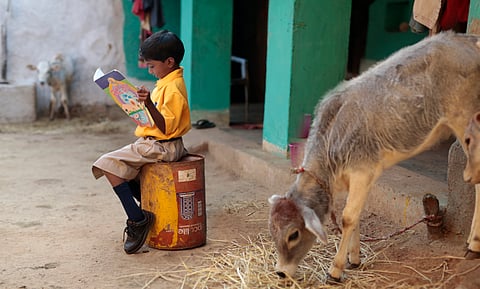

Yeshwanth grew up in a low-income community in Bengaluru. By the time he was five, he had already lost both his parents — his father first and then his mother to cancer. Raised by his grandmother, who worked as a househelp to support the family, there were several odds stacked against him.
But Yeshwanth’s story was destined to defy the statistics. At the age of five, he joined Christel House Bengaluru, a decision that set his family on a transformative 20-year journey.
Today, Yeshwanth is a Security Officer at IndiGo — proof of how education, paired with holistic support, can reshape a life trajectory.
His journey is just one among many shaped by Christel House, a global network of high-quality schools serving children from socio-economically disadvantaged backgrounds. Operating in five countries, Christel House provides a unique blend of rigorous academics, character development, and community engagement.
In India, the network has two schools — in Bengaluru and Nava Raipur, Chhattisgarh — with plans to expand to five more schools over the next decade.
Yashwanth’s success story prompts a critical question: What does it take to fundamentally alter the life trajectories shaped by poverty?
Education, often touted as the great equaliser, is traditionally confined to what happens inside the walls of a school — academics, extra-curricular activities and standardised exams.
While important, these measures only scratch the surface of what’s needed to tackle poverty. A child spends the majority of their time (over 60%) outside school, shaped by family, community, and systemic challenges.
At Christel House, we’ve had to rethink what quality means.
How do we design an institution that addresses not just what children learn, but the environment in which it shapes their lives? This requires going beyond conventional metrics and building comprehensive proof points for what transformative impact truly entails.
For instance, Christel House students are supported not only during their school years but well into their futures. The results speak volumes.
Christel House’s College & Careers Program provides five years of post-high school support, including mentoring, career counselling, and networking opportunities.
Alumni like Mary Carolina — who graduated from Azim Premji University and is now pursuing a Master’s in Psychology at Chanakya University — credit this programme for guiding their paths.
Today over 86% of Christel House Alumni have moved their families to higher economic bracket.
Another core belief at Christel House is that learning doesn’t end at the school gate. Families, particularly parents, are pivotal in shaping a child’s future. Yet, they are often overlooked in traditional education models.
Christel House has flipped this narrative, working with parents as equal partners in their children’s success.
Mothers in the community run after-school learning centres, bridging the gap between school and home.
A recent self-help group (SHG) initiative brought together 670 mothers across 34 committees, collectively saving Rs 37 lakh in a single year. These interventions build resilience within families and communities, ensuring the impact extends far beyond the classroom.
While foundational literacy and numeracy dominate the global discourse on education, a challenge that is undeniably critical, Christel House has quietly been building proof points of what solving for poverty truly looks like through education.
Our focus isn’t just on producing strong academic outcomes; it’s about enabling families to break the generational cycle of poverty. This means addressing the multifaceted nature of poverty, from economic instability to mental health challenges, and designing models that integrate education with broader social interventions.
Yeshwanth’s story, like Mary’s, is not an exception; it is evidence of what is possible when education is reimagined as a holistic, multidimensional tool for change.
But stories like theirs shouldn’t be rare exceptions — they should be the norm. This requires rethinking the way we approach education policy, focusing not just on academic outcomes but on building ecosystems that support children and their families at every stage of their journey.
What makes Yeshwanth’s journey even more compelling is that it’s not an exception.
Over 98% of Christel House students who begin school at age five graduate high school, and 99% of high school graduates enroll in higher education programmes at top colleges, universities, or technical institutions.At Christel House, we are asking different questions: How do we ensure education becomes a gateway to opportunity, not just a means to an end? How do we reimagine schools as hubs of community transformation?
Yeshwanth’s 20-year journey offers some answers — but it also inspires us to keep asking and pushing the boundaries of what’s possible.
(Vignesh Krishnan is a seasoned development sector professional with over a decade of experience driving impact across various nonprofit organisations in India. As the Director of Expansion at Christel House International, he leads the global growth of the organisation’s school network worldwide.)
